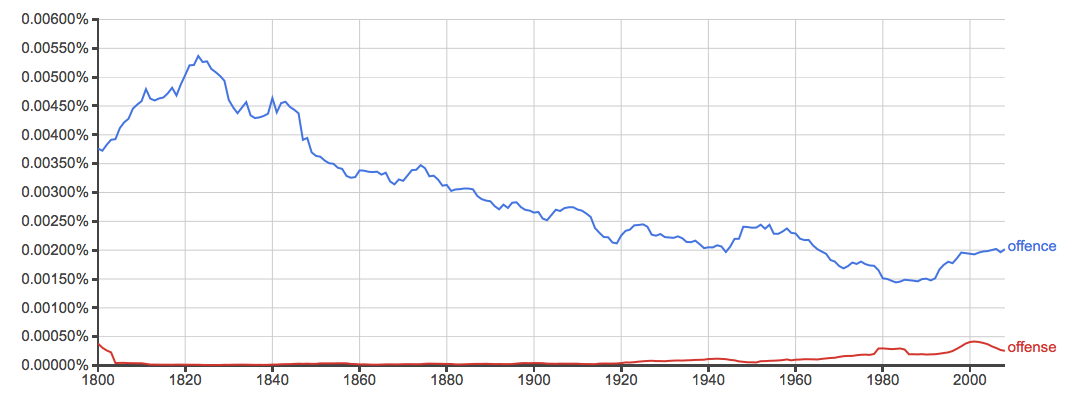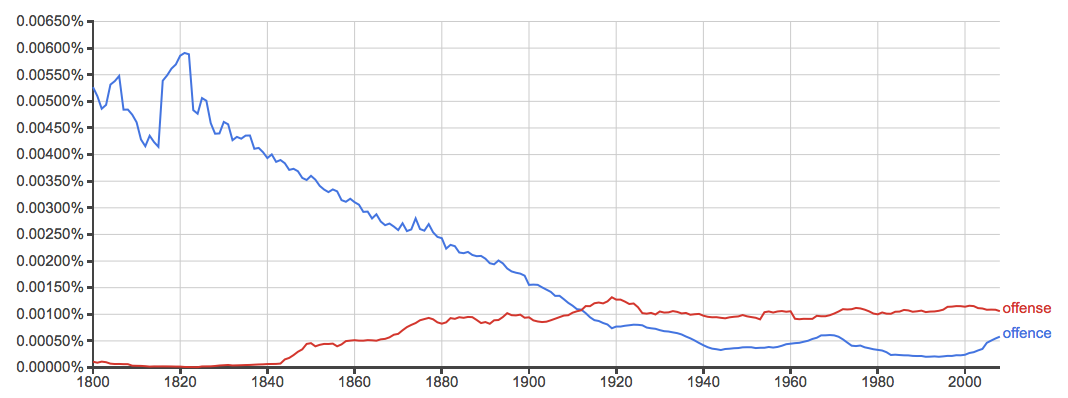The words offence and offense can be confusing for those not sure of their differences, and not knowing which to use and when can cause a writer to second-guess his or her work, even though there might not be anything wrong with it.
Do these words have different meanings or different functions in a sentence? Are they just variants of the same word? How exactly are they pronounced?
In this post, I want to answer each of these questions so that you will never again have to second-guess yourself while writing either offence or offense.
What is the Difference Between Offence and Offense
Offence and offense are both nouns, and they have a few different meanings:
- The act of causing anger, resentment, displeasure, or affront.
- A violation or infraction of a moral or social code.
- A transgression of law; a crime.
- The means or tactics used in attempting to score (sports).
Here are a few sentence examples,
- He had taken offense at the off-color remark.
- Her offence landed her in jail for 30 days.
- The Lakers have the best offense in the league.
You’re probably still wondering, “How do I know which one to use?”
The answer is, the difference between offence vs. offense is entirely dialectal. There is no demonstrable difference in function or meaning between them, and both words are used at similar rates throughout English but with different audiences.
When to Use Offence
 Although the only thing separating these two words is a dialectal difference, it is still important to keep your audience in mind when picking which word to use.
Although the only thing separating these two words is a dialectal difference, it is still important to keep your audience in mind when picking which word to use.
Offence (with a “c”) is the preferred spelling in British English. If you find yourself writing to a primarily British audience, offence is the correct word choice. For example, Fowler’s Dictionary of Modern English Usage, a well-known British usage guide lists offence as the preferred word choice.

The above chart shows that offence is clearly used more frequently than offense in British English.
When to Use Offense
 Offense (with an “s”) is the preferred choice in American English. If you are writing anywhere in North America, offense is the safer of the two options. If you use offence in North America, but the United States specifically, it will likely be flagged as a misspelling and distract your reader needlessly.
Offense (with an “s”) is the preferred choice in American English. If you are writing anywhere in North America, offense is the safer of the two options. If you use offence in North America, but the United States specifically, it will likely be flagged as a misspelling and distract your reader needlessly.
Garner’s Modern American Usage recommends using offense as the primary American spelling.

The above chart shows that offense is used more frequently in American English, but the margin is narrowing. Perhaps someday both spellings will be completely ubiquitous, but for the time being it’s still best to use offense exclusively in the states.
No Offence or No Offense?
These same dialectical distinctions equally apply to the popular phrase “no offense.” For example,
- No offence, but that shirt does not look good.
- No offense, but that shirt does not look good.
Both of the above examples are acceptable. Just keep your audience, British vs. American, in mind.
How to Pronounce Offense and Offence
In American and British English both, the preferred pronunciation, be it for offense or offence, is to accent the second syllable, ə-fĕns. Think of it as saying, “uh-fence.”
This contrasts an alternative and much eschewed pronunciation that stresses the first syllable, of-en[t]s. Think of it as saying, “off-ence.” This pronunciation is popular among sports commentators and athletes, but is widely shunned outside of that usage.
When referring to an offense in a legal sense, use the first pronunciation, ə-fĕns.
Remember the Difference
A good way to remember the difference between these words has to do with the letters that separate them.
Offence is the British spelling and has a “C” in it. Think of this “C” as representing the Royal Crown of the United Kingdom.
Offense is the American spelling and has an “S” in it. Think of this “S” as representing the word “States” in United States.
Summary
While these words have the same meaning, they are spelled differently in different regions. It’s important that you keep your audience in mind when using offense vs. offence.
Offence is the British spelling.
Offense is the American spelling.
The preferred pronunciation in American English and British English is to stress the second syllable.
Contents
